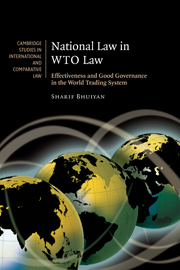Book contents
- Frontmatter
- Contents
- Acknowledgements
- List of abbreviations
- 1 Table of GATT cases
- 2 Table of WTO cases
- 3 Table of other cases
- 1 Introduction
- Part I
- Part II
- 5 The problem of characterization
- 6 Standard of review
- 7 National law as a question of fact
- 8 Mandatory and discretionary legislation
- 9 Conclusion
- References
- Index
8 - Mandatory and discretionary legislation
Published online by Cambridge University Press: 23 February 2010
- Frontmatter
- Contents
- Acknowledgements
- List of abbreviations
- 1 Table of GATT cases
- 2 Table of WTO cases
- 3 Table of other cases
- 1 Introduction
- Part I
- Part II
- 5 The problem of characterization
- 6 Standard of review
- 7 National law as a question of fact
- 8 Mandatory and discretionary legislation
- 9 Conclusion
- References
- Index
Summary
Introduction
In exercising their power of review, it is not unusual for judicial organs – whether domestic or international – to turn to analytical tools against which the legality of the contested measure can be usefully tested. For instance, under the administrative law of many countries, it is quite common for domestic courts to test the legality of administrative acts with the aid of tools of review such as “proportionality,” “legitimate expectations,” etc. As seen in Chapter 6, as a tool of review proportionality is also applied by international courts including WTO organs. It was also mentioned in that chapter that the distinction between mandatory and discretionary legislation is one of the prominent tools that WTO adjudicative bodies apply in reviewing the compatibility of national laws with the WTO obligations. In this context, the shorthand expression “mandatory legislation” is used to refer to national legislation that requires the executive authority of a Member to act inconsistently with its WTO obligations; and the expression “discretionary legislation” is used to refer to legislation that does not require but gives the executive a discretion to act in a WTO-incompatible manner.
According to this distinction (throughout this chapter the word “distinction” is used to refer to the distinction between mandatory and discretionary legislation), a mandatory law by itself violates WTO obligations even if there is no specific application of the law. By contrast, a discretionary law cannot by itself amount to a violation of WTO obligations and a violation can occur only if the law is actually applied in a specific case and in a WTO-inconsistent manner.
- Type
- Chapter
- Information
- National Law in WTO LawEffectiveness and Good Governance in the World Trading System, pp. 244 - 269Publisher: Cambridge University PressPrint publication year: 2007



